Hygiene DefinitionEvery action you perform to keep things clean and healthy is known as hygiene. The word "hygiene" is derived from the Greek deity of sanitation, hygiene, and good health. Actions and behaviors that help to maintain health and prevent the spread of disease are referred to as hygiene. 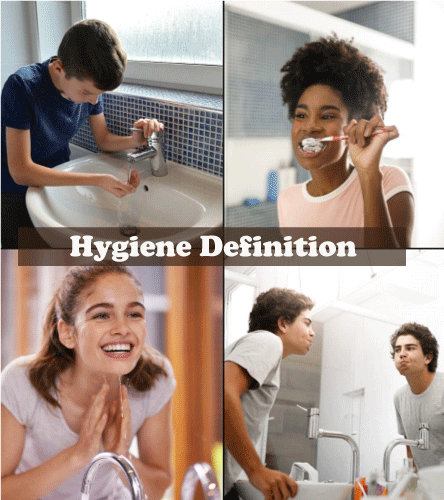
Many individuals think that "hygiene" and "cleanliness" are the same, but actually, both are different terms. Hygiene generally includes actions that stop the spread of diseases, and cleaning includes activities that remove harmful germs, dirt, and soil. Types of Hygiene1. Personal Hygiene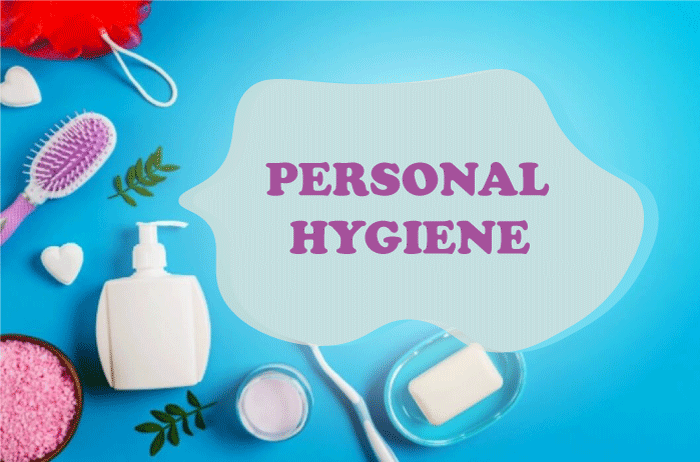
Personal hygiene refers to actions taken by a person to protect their physical health and wellness through cleanliness. Types of Personal Hygiene: 1. Hand Washing The mouth, nose, eyes, and ears are the basic entry points for germs from your hands. One of the best methods to prevent you and your family from getting sick is to wash your hands frequently. Tips for Wash Your Hands:
3. Oral Hygiene Gum disease and cavities can be avoided with proper dental and gum hygiene. Brush for two minutes twice every day. Brush as soon as you wake up and before you go to sleep. Maintain regular oral hygiene to get rid of plaque. Use dental floss, a unique brush, a wooden pick, or any other item to clean your teeth. You can also use a floss threader, floss holder, or water flosser. Use fluoridated water to keep your teeth healthy. It protects your teeth throughout the day if you drink water with the correct quantity of fluoride. Brushing Tips:
These steps can help to stop tooth decay and remove bacteria and germs between tooth gaps. 3. Sickness Hygiene You must take precautions to avoid infecting others if you don't feel well. As you cough or sneeze, cover your mouth and nose to prevent the transmission of dangerous respiratory viruses, including influenza and respiratory syncytial virus (RSV). Put your used, dirty tissues in the garbage. 4. Nail Hygiene Cleaning and cutting your fingernails, which can store dirt and bacteria, is important to maintaining good hand hygiene. Longer fingernails can hold more dirt and bacteria than shorter ones due to their length. Infections of the fingernails or toenails are frequently identified by swelling of the nearby skin, pain, or thickness of the nail. These infections sometimes require medical treatment. Nail Hygiene Tips:
5. Shower Hygiene Showering with soap can help to remove oils, germs, & dead cells. Baths, steam rooms, and other bathing practices can boost immunity, ease muscle, and joint pain, reduce swelling, promote blood flow, and reduce tiredness. It removes bacteria and other germs that cause rashes and other skin issues. Also, wash your hair twice a week. Shampooing your hair and scalp removes accumulated skin cells and guards against greasy residues that could irritate your skin. Use shampoo and running water to remove dirt, oil, and undesirable residue from your head. Hair Hygiene Tips:
6. Menstrual Hygiene Proper menstrual hygiene habits will help you avoid infections, minimize odors, and stay comfortable. To absorb or collect blood during your period, you can use a variety of menstruation goods, such as menstrual cups, sanitary pads, tampons, menstrual discs, and period underwear. Instruction to Used Menstruation Goods: Follow the below instructions while using menstruation goods:
Menstrual Hygiene Tips:
3. Food Hygiene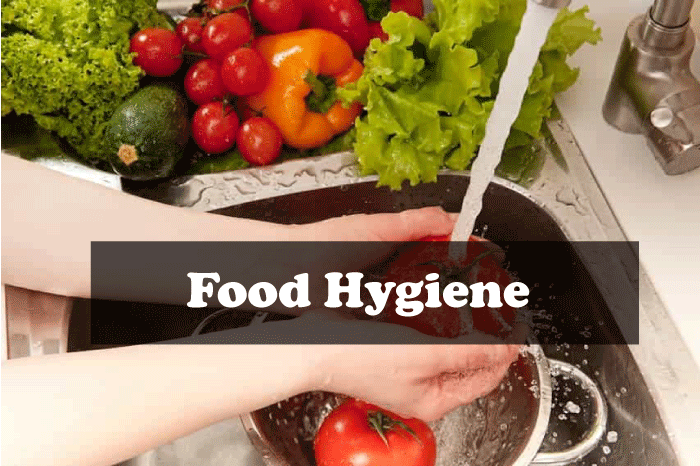
Food hygiene refers to the activities performed to store and prepare food safely for human consumption. Food hygiene aims to stop food from being contaminated & prevent food from causing food poisoning. Contaminated food is among the major threats to the health of the population. It is the main reason for the spread of disease. Food stored for a long time may contain infections or hazardous chemicals. The foods that are eaten raw, such as fruits and vegetables, are easily contaminated by flies, dirty hands, and unclean water. Inadequately cooked food could cause chemical poisoning. For example, incorrectly cooked and crushed cassava leaves may have deadly cyanide levels. Tips for Food Hygiene:
3. Environmental Hygiene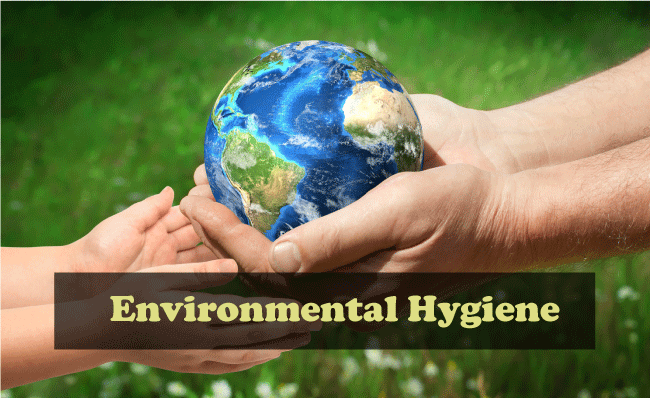
Environmental hygiene aims to establish secure environments to stop the disease. Environmental hygiene includes cleaning, pest control, de-infestation, and fumigation procedures. Environmental hygiene includes the safe and proper management of sharps, blood, body fluid spills, and garbage. The health of the present and future generations is protected through environmental hygiene. Environmental hygiene's purpose is to decrease the infectious agents that might be present on surfaces and to reduce the chance of germs spreading from one person to another. 4. Domestic Hygiene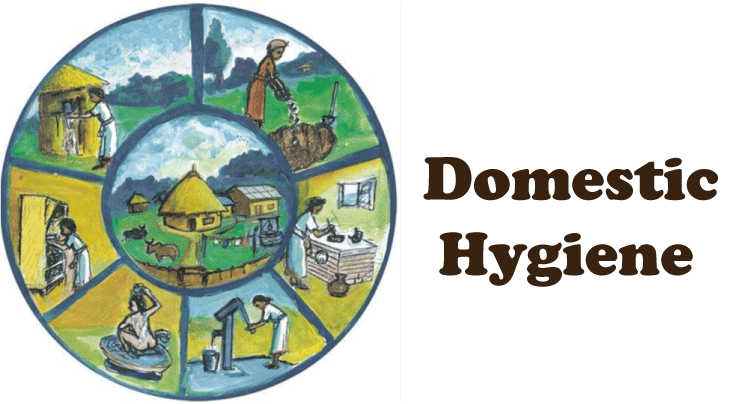
The tasks performed to maintain the cleanliness of a home are considered domestic hygiene activities. These tasks include cleaning the toilet, washing the clothes, bedding, and washing cooking equipment and dishes after meals. Cleaning the house every day is essential to keeping your home healthy. If the house and household items are not cleaned regularly, moisture and dirt accumulate, making a suitable environment for breeding and growing germs, parasites, and vectors. Domestic hygiene also includes using soap, appropriate ventilation, fresh air, cleanliness in food storage, correct trash disposal, and keeping pests, vermin, and insects out of the home. Benefits of HygieneYou come into contact with millions of external viruses and bacteria every day. They might stay on your body for a while, sometimes making you ill. Keeping yourself clean can help you to avoid getting sick. The benefits of hygiene are explained here: 1. Health Benefits Maintaining a healthy body is crucial for preventing infection. The transmission of germs from one person to another and from one area of your body to another is avoided by washing your hands. 2. Social Benefits Body cleanliness and good personal hygiene can reduce breath and sweat odor. It improves an individual's physical appearance and enhances their impression. 3. Preventive Benefits It is claimed that prevention is always better than treatment. The spread of epidemic diseases can be stopped by practicing good personal and social hygiene. Due to hygiene, the enormous cost of treating diseases can be avoided. Harmful Effect of Poor HygienePoor personal hygiene practices can have mild negative effects, such as body odor and oily skin. It might also cause severe, dangerous issues. The illnesses caused by poor personal hygiene are mentioned below: 1. Body Lice Body lice infestation is frequently transferred through direct personal contact. Severe itching, rashes, and red lumps on the skin are signs of body lice. 2. Scabies It is a serious skin condition caused by bad hygiene. It happens if an individual lives near a person with scabies mites or when individuals live in crowded, filthy surroundings. Symptoms of scabies include itching, rashes, sores, and thick bumps on the skin. 3. Trachoma Trachoma is easily transmitted by direct human contact. The signs of trachoma are mild itchiness in the eyelids and eyes, eyelid swelling, photophobia, pain, and vision loss. 4. Lymphatic-Filariasis Tiny, thread-like worms cause a parasitic condition called lymphatic-filariasis. Inflammation, edema, lymphedema, and hydrocele are signs of lymphatic-filariasis. 5. Swimmer's Ear Swimmer's ear is a bacterial infection caused by water left in the outer canal of the ear for a long time, creating a moist environment for bacteria to flourish. Symptoms of Swimmer's Ear
6. Pinworm A tiny, thin, white roundworm known as Enterobius vermicularis causes pinworm infection. It is easily transmitted from a pinworm-infectious person to his kids and family members. 7. Ringworm Ringworm is a type of skin infection. It can cause a circular rash that is typically red and itchy, hence the name "ringworm." The fungus that causes ringworm infection can reside on surfaces, clothing, bedding, towels, and other household items. The medical word for it is" dermatophytosis" or "tinea." FAQs on Hygiene1. What are the Four Categories of Hygiene? Answer:
2. List out the Hygiene products. Answer: Hygiene products are things that are used to clean our things and ourselves.
3. What are the advantages of personal hygiene? Answer:
4. What are the advantages of environmental hygiene? Answer:
5. What are the four Cs of food hygiene? Answer:
6. What is the difference between community hygiene and domestic hygiene? Answer:
Next TopicInterest Definition
|
 For Videos Join Our Youtube Channel: Join Now
For Videos Join Our Youtube Channel: Join Now
Feedback
- Send your Feedback to [email protected]
Help Others, Please Share









